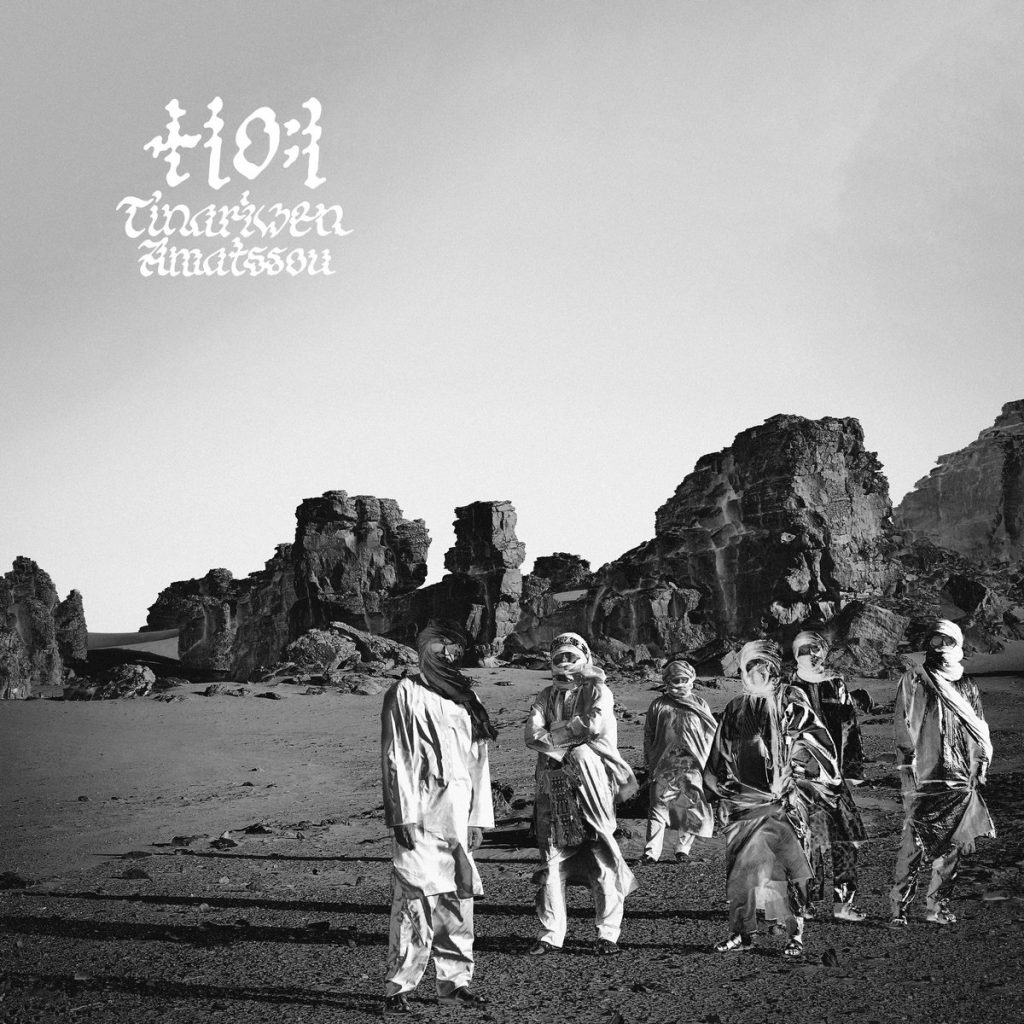TINARIWEN, “Amatssou” (Wedge, 2023)

Non dovrebbe essere una sorpresa trovare i maestri Tuareg Tinariwen abbracciare la firma del country blues di Nashville; tale è la connessione e le radici tra le due sfere musicali. Dopotutto, il leggendario maliano Ali Frake Touré si è unito decenni fa a Paris, Texas, collaborando con l’icona americana Ry Cooder per l’album Talking Timbuktu, vincitore di un premio Grammy.
Sebbene ancora ampiamente dibattuto, si dice che il blues abbia preso forma, con il seme piantato in Mali e nelle sue zone di confine contese, nei deserti, secoli, se non millenni fa. Il commercio degli schiavi lo ha portato nelle Americhe colonizzate dagli europei; la sua forma più pura, culturale e spirituale si è rivelata, sebbene soggiogata, feconda per una miriade di stili musicali che sono cresciuti attorno al blues nel Deep South, includendo praticamente tutto, dal country al bluegrass e all’Americana.
Con questo in mente, ma anche con nient’altro che amore e rispetto per la band nomade Tuareg, che ha due decenni di storia, Jack White è stato mosso a invitare i Tinariwen a registrare nel suo studio di registrazione privato a Nashville. White aveva precedentemente prestato il suo ingegnere Joshua Vance Smith per mixare l’ultimo album del gruppo, Amadjar, uscito nel 2019. Il frequentemente menzionato “sideman” Fats Kaplin, uno dei pochi selezionati musicisti di Nashville a collaborare in questo ultimo progetto, aveva suonato anche nel loro album del 2014, Emmaar.
Purtroppo, a causa di una serie di sfortunati contrattempi, questa registrazione su suolo americano non si sarebbe realizzata. Con il rinomato Daniel Lanois e un gruppo di musicisti country coinvolti in questa proposta, il progresso è stato bloccato dalla pandemia di COVID-19, impedendo a Ibrahim Ag Alhabib, Touhami Ag Alhassane, Abdallah Ag Alhousseyn e agli altri membri dei Tinariwen di volare. Lanois e la sua compagnia hanno deciso di recarsi da loro, ma il famoso produttore è stato colpito dal virus e costretto a cancellare i piani.
In pericolo, la tecnologia si è rivelata la salvatrice, poiché entrambi i partner di questo album hanno registrato le loro parti separatamente, a migliaia di miglia di distanza. Il luogo d’ispirazione dei Tinariwen è stato l'”oasi” di Djanet, all’interno dei confini del deserto meridionale dell’Algeria e del Parco Nazionale del Tassili N’Ajjer, un sito del patrimonio mondiale dell’UNESCO, famoso per l’arte rupestre preistorica. Mentre sia Kaplin che il collega musicista country Wes Corbett hanno registrato i loro contributi a Nashville, con ulteriori percussioni aggiunte da Amar Chaoui in uno studio di Parigi: una produzione tricontinentale, si potrebbe dire. Non è una cosa di cui ci si accorge, perché il processo di transizione si svolge senza soluzione di continuità.
Continuando nel loro ambiente africano, suonando insieme in una tenda improvvisata con attrezzature prestate dai loro colleghi musicali Tuareg degli Imarhan (si può sentire il chitarrista della band, Hicham Bouhasse, contribuire ed ampliare l’ensemble ancora di più), i Tinariwen intrecciano la loro firma “Assouf” (nostalgia) fatta di chitarre che vengono pizzicate, rovesciate, in un incantesimo ipnotico e in costante movimento, e ritmi beduini di movimento cammellato, e cori del deserto con il clip-clop, lo scivolo dell’acciaio a pedale delle carriole e i suoni del banjo che si intrecciano con la prateria americana, le stalle, le danze nelle stalle e i sentieri dell’Ovest.
L’afflizione e la nostalgia bluesy americana trovano conforto nel tormento e nel desiderio della situazione dei Tuareg, molti dei quali sono costretti a disperdersi in tutto il continente africano e all’estero mentre il Mali sprofonda nel caos. Nella lunga lotta per uno stato autonomo (l’Azawad) nelle regioni nord-orientali del Mali, il popolo Tuareg ha subito le violenze del governo centrale, la loro causa è stata dirottata da estremisti islamisti zelanti (in gran parte respinti quando i colonizzatori francesi sono stati invitati a fermare il loro sanguinoso progresso), hanno subito ulteriori disordini civili con un colpo di stato militare nel 2020 e un colpo di stato successivo e hanno sopportato una serie di siccità e disperazione economica. A causa dei successi ottenuti dagli integralisti jihadisti durante questa decade di tumulto, alcune regioni periferiche dei Tuareg erano sottoposte a rigidi codici islamisti, incluso il divieto di chitarre e della loro musica. Ciò ha costretto alcuni gruppi a cercare rifugio oltre i confini, con alcuni che si sono trasferiti persino in Europa e oltre.
Quella lotta, quel travaglio, è splendidamente espresso nella lirica e nell’emozione musicale panoramica del deserto. E così, due ambienti desertici si fondono in armonia: il riconoscibile suono Tuareg, con le sue chitarre intrecciate e la leggera essenza di bluegrass, Americana e country blues di Nashville, che si fondono in una consegna disarmante di una canzone struggente.
Amatssou è un’incantevole e ipnotica gioia, e gli ostacoli non hanno nulla per influire o scalfire il concetto originale di un’unione combinata e congrua.
(Dominic Valvona)
english version:
It shouldn’t really come as any surprise to find those Tuareg doyens Tinariwen embracing the country blues signature of Nashville; such is the two musical spheres connection and roots. After all, the late Malian legend Ali Frake Touré teamed up decades ago with Paris, Texas scoring American icon Ry Cooder for the Talking Timbuktu album – a Grammy Award winner no less.
Although still hotly debated, the blues is said to have taken shape, the seed laid in Mali and its disputed borderlands, deserts, centuries if not a millennia ago. The slave trade saw it carried to the European-colonized Americas; its purest, cultural, spiritual form proving, though subjugated, a fecund for a myriad of musical styles that grew in and around the blues in the Deep South, including agreeably everything from country to bluegrass and Americana.
With that in mind, but also with nothing less than a love and respect for the two-decade incarnation of this much older Tuareg nomadic band, Jack White was moved to invite Tinariwen over to record at his private recording studio in Nashville. White had previously lent out his engineer Joshua Vance Smith to mix the group’s last album, released in 2019, Amadjar. Oft “sideman” Fats Kaplin, who is one of the few select Nashville-imbued players to collaborate on this latest project, had also played on their 2014 album, Emmaar.
Unfortunately, due to a series of unfortunate setbacks, this American soil recording wasn’t to be. With the renowned Daniel Lanois and a circle of country musicians now attached to this proposal, the COVID pandemic grounded progress, with Tinariwen’s lineup of founders Ibrahim Ag Alhabib, Touhami Ag Alhassane and Abdallah Ag Alhousseyn and bassist Eyadou Ag Leche, percussionist Said Ag Ayad and guitarist Elaga Ag Hamid all prevented from flying. Lanois and company decided to travel to them instead, only the famed producer was struck down with the virus, and so forced to cancel plans.
Thrown into jeopardy, technology would prove the savior, as both partners on this album now recorded their parts separately, thousands of miles apart. Tinariwen’s inspired location was the Djanet “oasis”, within the borders of Algeria’s southern desert and the Tassili N’Ajjer National Park – a UNESCO World Heritage site, famously home to prehistoric cave art. Whilst both Kaplin and fellow country muso Wes Corbett recorded their contributions in Nashville, with further percussion added by Amar Chaoui in a Paris studio: a tri-continental production you could say. Not that you’d ever know it, as the transition, process runs together seamlessly.
In their African surroundings, playing together in a makeshift tent with borrowed equipment from their Tuareg musical peers Imarhan (the band’s guitarist Hicham Bouhasse can be heard contributing and expanding the ensemble even further), Tinariwen entwine their “Assouf” (“nostalgia”) signature of pick-up picked, turned-over, constantly moving guitar hypnotism and camel-motion Bedouin rhythms, and desert chorus voices with the clip-clop, wagon-hitched, pedal-steel slide and twirled banjo sounds of the American prairie, cowshed, barn dance and Western trail.
The bluesy ache and pine of America finds solace in the tumult ache and longing of the Tuareg plight; many forced to scatter across the African continent and overseas as Mali plunges into further chaos. In the long-running fight for an autonomous state (the Azawad) in the North-Eastern reaches of Mali, the Tuareg people have suffered at the hands of the central government; had their cause hijacked by zealous Islamist insurgents (forced out for the most part when former colonists France were invited to stem their bloody progress); seen further civil unrest with a military coup in 2020 and subsequent coup d’état; and endured a catalogue of droughts and economic desperation. As a consequence of the Jihadist hardliners gains during this decade plus turmoil, some outlier regions of the Tuareg were under strict Islamist codes, including the banning of guitars and their music. This forced some groups to seek sanctuary over the borders, with some even moving on to Europe and further afield.
That struggle, travail is beautifully conveyed in the lyricism and the musical panoramic-gazed desert emotions of longing. And so, two desert settings in harmony merge; the unmistakable Tuareg ease and spindled play of guitars blending with subtle essences of bluegrass, Americana and Nashville country blues; disarming in delivery that plaintive song.
A Sahel version of The Band; a fiddled playing barn dance in Timbuktu; and Cooder looking out across a shamanistic vision of out-of-body, otherworldly Americana, the dual Western horizons, when coming together like this, offer up bendy mirages, spins, softened stomps, elliptical bobbing motion sways and scuzzy dirt music. Acoustic and electrified, with spells of the Deltas, the Grand Ole Opry, Appalachians and Missouri breaks throughout, the Tuareg sound finds an harmonious distant relative Stateside.
Amatssou is a captivating, hypnotic joy, the setbacks doing nothing to affect or dent the original concept of a combined, congruous union.

The Monolith Cocktail è un blog indipendente con base a Glasgow, Scotland (UK).
Le ragioni della collaborazione tra Kalporz e The Monolith Cocktail puoi leggerle qui








